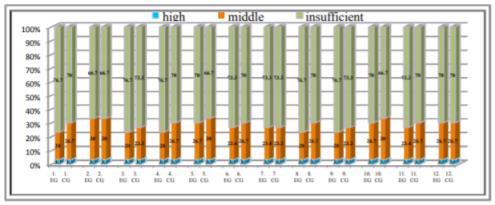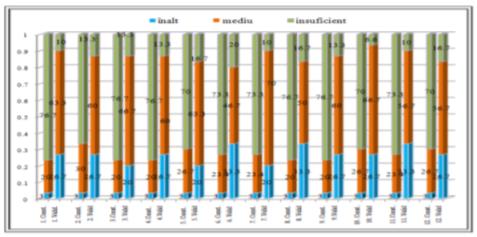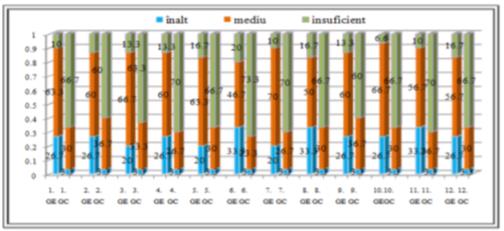Abstract
The pedagogical research focusing on the study of pedagogical evaluation contributed to the development of educational theory and practice by introducing concepts into the culture of pedagogical evaluation and experimental validation of the strategic approach to the culture of pedagogical evaluation, in order to prevent errors related to the educational process. One of the routes for guidance in the investigational study was the assessment of the multiple approaches to pedagogical evaluation, which led to focusing on the concept of culture of educational evaluation as a solution to prevent subjective evaluation. Researchers have identified the theoretical foundations of educational evaluation which have been integrated into a coherent system focused on theories, models and principles of evaluation: continuity, irreversibility, optimization, ordering to achieve the functions of evaluation: control, transmission, regulation/self (adaptation/improvement), conversion, socio-emotional encoding/decoding. In this context, the contemporary docimologic trend to ensure the evaluative device necessary to objective evaluation was reflected. It has been scientifically proven that pedagogical phenomena recorded in the subjective evaluation of contemporary education can be prevented by promoting and building a culture of pedagogical evaluation.
Keywords: Evaluationerrors in evaluationculture of pedagogical evaluationevaluation strategies
Introduction
The development of epistemic significance for “evaluation”, generated by the coherence of the
principles in constructive approach for education, is objectified in interactive pedagogy, which aimed
interactive evaluation, defined by M.D. Bocoş (2013) is favorable of revealing educational difficulties.
Interactive is defined the evaluation that provides clear information about its cognitive development and
offers to teachers information about the quality of didactical strategies towards reconstruction of
educational technologies, thus becoming possible to adjust the quality of education, suggesting directions
to curricular accommodation of pedagogical offer.(Bocoş, 2013, p.114)
The ideas revealed by C. Cucoş (2008) offer a present sense to the term of culture of pedagogical
evaluation and allow to alert about the need of defining more exactly of pedagogical evaluation culture
values, both from the teachers and from the students. This will allow to us to notice that the act of
evaluation release, often, an artificial frame, marked of a remarkable distance between observation
conduct and the observed proper conduct. (Voiculescu, 2001)
The assessement test can be converted to a made situation, meaning the rated agent (the student) is
forced to adopt the desired conduct by itself default prescription "hidden" in the test. (Cucoş, 2008, p. 55)
We ascertain into the specific literature ideas which support the subjective evaluation, too. For
exemple, Elisabeta Voiculescu (2007) says that "an evaluation purely objective, impersonal and
absoultely neutral, means a devoid evaluation of subject, it is not only practically impossible, but a little
relevant than an evaluation which hire the subjectivity, the values, the atitudes of the assessor or/and of
the assessed." (Voiculescu, 2007, p.41)
The present article shows the results of an experiment pedagogical approach on diagnosis and
prevention of errors in shaping the culture of school evaluation. The experimental research methodology
included investigative methods through which we analysed the features of the docimologic conduct of
teachers in the evaluation process.
The more we achieve a stable equilibrium among the main components of the pedagogical
evaluation, on the one hand, fairness and objectivity of evaluation, on the other hand, we can expect to
achieve higher professional performances in school evaluation with a view to increasing the culture of
pedagogical evaluation from the perspective of constructing a successful teaching career.
The more we ensure a better match between the components of the culture of pedagogical
evaluation, the more we can exclude subjectivity in evaluation and the teacher-students / school group
relationships will be significantly raised as factors influencing performance in learning/studying and
school success.
Aims of Investigation
• determining the issues of the pedagogical evaluation at process level;
• constructing the tools for pedagogical diagnosis of teaching effectiveness in the pedagogical
evaluation process;
• describing the degree of objectivity in evaluating for teachers.
In designing the investigation, sampling the research subjects (60 teachers) was a special concern
because it determined the success of the experimental approach conditioned by fairness, thoroughness and
accuracy of experimental actions. The sampling of the investigated population was performed by
stratification, considering that the optimum deployment of the pedagogical experiment should take place
in the natural context of the organization of the educational process.
The Finding Step of the Research
The finding step of the research involved the organization of the pedagogical experiment on the
subjects to examine pedagogical evaluation practices, and led to the delineation of errors in school
evaluation; the pedagogical diagnosis of the effectiveness of evaluating through quantitative and
qualitative methods in relation to the dimensions of the culture of pedagogical evaluation; determining the
school teachers’ representations regarding the quality of evaluation.
Throughout the pedagogical experiment we applied the Test of self-assessment of the degree of
objectivity of teachers in pedagogical evaluation which is used as a standardized tool consisting of a
series of test-paper items developed to record behavioural manifestations to stimuli administered in
pedagogical evaluation. The test provides, through its specificity, quantitative information on the
phenomenon of objectivity in school evaluation. The requirements of the test are: validity, reliability,
standardization, calibration. I considered functional for research purposes Test of self-assessment of the
degree of objectivity of teachers in pedagogical evaluation, adapted from Jinga I. and elaborated by
Neacsu I., (1998) “Are you objective in didactic evaluation?”.The 12 items of the test correlate with the
theoretical values determined in the research theory, being reflected in the experimental part of the
research paper, under criteria for assessing the objectivity of the teacher. The evaluation descriptors of the
test vary from one item to another. The score given is within the range 0-5 points, corresponding to
Insufficient (0 -1 points), Medium - 3 points and High - 5 points.
Interpretation of the Resultsof the Test of Self-Assessment of the Degree of Objectivity of Teachers in Pedagogical Evaluation
The evaluation of the results of the questionnaire has revealed the general level of objectivity of
teachers, the subjects being distributed in experimental and control groups. The Finding phase of the
experiment is characterised by levelling the results for all groups of subjects, which were diagnosed based
on the same instrument and timeframe. The core values of the research are formulated in terms of
desirable behaviours of CPE shown in the figures and tables below, according to their corresponding
number where the experimental group is marked by the abbreviation GE and the control group - GC:
1. accuracy of methodological choice
2. sequence of decision
3. objectivity of the evaluation for anticipating subjective evaluation
4. accuracy of the evaluation (measurement - assessment - decision)
5. extension of evaluation
6. compatibility of self-evaluation decision
7. focus on the student
8. accessibility of the content to be evaluated
9. design of evaluation criteria
10. communication of the decision
11. management of the decision
12. authenticity of the evaluation.
The concept of CPE acquires new praxiologic meanings both at macro and micro structural level.
At the level of education, we are interested not only in teaching staff perspective, but also the prospect of
self-training students in the complex route of building self-assessment competence, unlike traditional
duties. Figure

Item no. 1 represents the level of training to teachers the values of a culture of pedagogical
evaluation by the accuracy of the methodological choice, and the findings are that only 3.3% of teachers
in the experimental group and the control group correlate, at a high-level, the process of establishing
operational objectives in didactic designing with the method and the content of the evaluation tests,
respectively 70% of subjects in the control group and 76.7% in the experimental group carry out this
specific task at insufficient level.
The question that revealed data about student progress monitoring led to the degree
consecutiveness led to appreciating the level of the sequence of decision. Among the groups of research
subjects, 66.7% mentioned that they never see again the notes comprising findings from checks made in
the past years, before designing the content a a new evaluation test, because they know these findings by
heart. No less compelling is the answer of 30% of teachers in the two groups who do this accidentally,
unless they have failed to write some conclusions on previous evaluation tests and only 3.3% of teachers
revisit the notes comprising findings of the previous evaluation tests.
With question no. 4 of the test we evaluated the degree of accuracy (measurement - assessment -
decision) of school teachers when evaluating their students. Similarly, 3,3% of teachers use a detailed
checking grid with the partial scores given for each element of the response; 26.7% of the subjects in the
control group set out certain criteria that they remember and take into account while evaluating students’
work; and 76.7% of respondents in the experimental group believe that it is not the case to do that, as they
rely on judgment and experience and are able to evaluate the students’ work correctly.
Similarly, for a current test paper, only 3.3% of teachers announce the results obtained by the
students as soon as possible, starting with the day of the test paper, by giving checking grid to the
students, and, respectively, the opportunity to receive answers to questions arising from certain
ambiguities, doubts, suspicions, thereby demonstrating the accessibility of the content to be evaluated. A
percentage of subjects (20% and 26.7%) announce the results the following day, briefly highlighting the
students’ typical errors; and only 3.3% of the teachers surveyed believe that the results achieved by the
students may not necessarily be announced on a certain day, but according to the time available to the
teacher. A test item assessed the extent to which teachers design the evaluation criteria for assessing oral
responses. We found that 76.7% of teachers in the experimental group and 73.3% in the control group
never establish these criteria but only 3.3% of teachers do that, which correspond to a high level of culture
of pedagogical evaluation. One aspect identified by question 11 of the test targeted certain situations
addressed as correct from the teachers’ perspective, which is actually less adjusted to the concrete
situation, recording results on the management of the decision. The self-evaluation tests for teachers
invited them to choose one of the listed answers on the decision about the final grade if the results of the
test paper are almost all below grade “7”. Data collection showed that 73.3% of teachers increase all the
grades with one or two points. Quite a few teachers (23.4% in the experimental group and 26.7% in the
control group) cancel the planned test paper and schedule another one, possibly after a consultation.
The Strategic Approach to the Training of Pedagogical Evaluation Culture
Continuous training of teachers was conducted through participation of school teachers in the
experimental group of the research to thematic meetings and methodological seminars on the topic of
Training of pedagogical evaluation culture to teachers in which specific CPE issues on the CPE essence
and content were discussed; designing evaluation strategies and CPE assessment of teachers. In this
research context, we mention that, by assessing pedagogical evaluation culture of school teachers, we can
get optimal feedback on actions of teaching-learning-evaluation. Regular meetings were held with the
teachers included in the experimental group of the research, the aim being to promote pedagogical
evaluation culture and ensuring the quality of education. In Romania, the thematic round tables are
regularly being held during school teachers’ meetings. Another strategy of lifelong vocational training in
secondary education is the Pedagogical roundtable which entails the exchange of good practices and
update evaluation strategies. Quality is the fundamental principle in achieving Pedagogical roundtables on
a specific CPE content and theme, the teaching approaches being oriented to the optimization of the
teaching-learning-evaluation process.
Continuous training of teachers in terms of pedagogical evaluation culture were directed towards
the adjustment of the regulating function of the system, improvement of the didactic activity and
optimisation of students’ school results, consisting of joint efforts of evaluators and evaluated subjects in
order to make the required “corrections” - based on the appreciation and control of the leadership style
and respectively of the execution activity. When evaluating the students’ results, school teachers were
guided to focus mainly on improving their own teaching style, the learning skills and the stimulation of
the motivational factors of professional development.
The interpretation of results of the evaluation form of docimologic conduct of school teachers and
students at the validation stage of the experiment was performed through the method of comparing data
from subjects of the research groups to evaluate the level of training of the pedagogical evaluation culture
during the two experimental stages.

In the table above, one can notice that there is a substantial change in the values of the pedagogical
evaluation culture of teachers in the experimental group - the subjects in this group are teachers involved
in the training program through the strategic approach. A significant increase of the high level was
recorded at the validation stage of the experiment by 33.3% of teachers in the process of compatibility
decision of evaluation and self-evaluation, accessibility of the evaluated content and the management of
the decision, which is explained by their awareness of the study subject and good practices on pedagogic
docimology.
Increased percentage values may be observed at 70% of teachers who demonstrated, throughout
the evaluation of school results, the application of the principle of focusing on the student, without
relying on small grades at the beginning of the semester, and then, towards the end of that semester, give
high grades so that the average obtained by students can adequately reflect the level of their training, and
considering that this can introduce a strong dose of subjectivity in grading students at the findings stage
of the experiment, this value being registered only to 23.3% of teachers.
The notification of the decision of the missing elements in the student’s response, making him/her
to realise the correctness of the grade received, recorded a difference of percentage values in comparing
the results with the finding stage, while validating the insufficient level, this being shown only by 6.6% of
teachers in comparison with the 70% achieved during the finding stage of the experiment.
If we compare the results to teachers in the experimental group and the control group, we can
notice a significant increase in the percentage values for medium and high levels recorded by subjects in
the experimental group and their decrease to the insufficient level.

From the 30 teachers in the experimental group 4.1% considered optimal to announce the results
obtained by the students at a current test paper as soon as possible, starting with the day of the test, giving
the students a checking grid, and, respectively, the opportunity to get answers to questions arising from
certain ambiguities, doubts, and suspicions. In the same context, an average value of 3.5% of the subjects
showed statistically the accuracy of the methodological choice through which school teachers always
establish operational objectives in their didactic design, correlating the content of the evaluation tests.
The pedagogic experiment has allowed diagnosing the degree of objectivity in school evaluation
and assessment of the levels of the school evaluation of school teachers, which helped determine the most
frequent errors in school evaluation. Pedagogic evaluation culture requires permanent restructuring of
evaluation strategies and asks for teachers’ flexibility, creativity, spontaneity and adaptability to emerging
situations and conditions and depends largely on their ability to quickly grasp the weaknesses and fix
evaluation errors in due time.
Conclusions
The effectiveness of the experimental intervention in our research is demonstrated by the
experimental data obtained at the validation stage, which revealed statistically significant differences on
increasing the CPE levels of school teachers.
The research instrument taken from the field literature proved to be fertile when elucidating
educational purposes the realities on the frequency of evaluation errors. The educational training actions
within the process of training are functional for CPE training.
The objectives of the experimental research were achieved, and the results obtained through the
application of methods of statistic calculation proved by the significant differences recorded the
efficiency to of the Strategic CPE training approach in secondary education at improving teachers’
evaluation skills within the meaning of mandatory compliance with a code of ethics, ethical evaluation in
terms of evaluation culture at certain values of objective evaluation, which constitutes a valid reference
framework for the training and evaluation of vocational skills of teachers within the school perimeter.
References
- Bocoş, M. (2013), Interactive training, Iasi, Polirom Publishing House.
- Cucoş, C. (2008), The theory and the methodology of evaluation, Iaşi, Polirom Publishing House.
- Neacsu I., Stoica, A. (1998), General guide evaluation and examination, Bucuresti, Aramis Publishing House.
- Voiculescu, E. (2001), Pedagogie preșcolară, Bucuresti, Aramis Publishing House.
- Voiculescu, E. (2007), Subjective factors of the scholar evaluation,Knowledge and control, Bucuresti, Aramis Publishing House.
Copyright information

This work is licensed under a Creative Commons Attribution-NonCommercial-NoDerivatives 4.0 International License.
About this article
Publication Date
25 May 2017
Article Doi
eBook ISBN
978-1-80296-022-8
Publisher
Future Academy
Volume
23
Print ISBN (optional)
-
Edition Number
1st Edition
Pages
1-2032
Subjects
Educational strategies, educational policy, organization of education, management of education, teacher, teacher training
Cite this article as:
Oproescu, A. (2017). Prevention Of Errors In The Evaluation Process. In E. Soare, & C. Langa (Eds.), Education Facing Contemporary World Issues, vol 23. European Proceedings of Social and Behavioural Sciences (pp. 2019-2026). Future Academy. https://doi.org/10.15405/epsbs.2017.05.02.250

